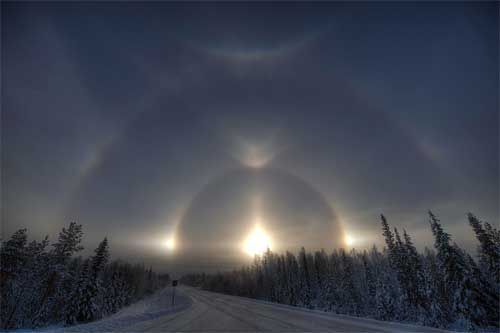Circular Apparition
This appariton is:

This section requires Javascript.
You are seeing this because something didn't load right. We suggest you, (a) try
refreshing the page, (b) enabling javascript if it is disabled on your browser and,
finally, (c)
loading the
non-javascript version of this page
. We're sorry about the hassle.
1 solution
It can sometimes happen in Singapore. The last time I saw it it was quite a sunny day. Are halos supposed to be possible in the equator?
Log in to reply
Yes, since at very high altitudes, it can be very cold and these kinds of microscopic ice crystals can form. It's more often seen from airliners at cruising altitudes, seen when the sun is shining through high clouds that are formed of such ice crystals instead of water droplets.
There are also the occurance of halo due to water vapour, what makes ice halo different from them?
Log in to reply
Water vapour droplets are still much like raindrops, which is spherical. When you have anisotropic hexagonal ice crystals, the mathematics of scattering is much more interesting!
This was inspired by this Circular rainbows . The correct answer to that one is not because "rain drops are spherical"
IT'S A UFO
Log in to reply
When elected president, Hillary Clinton promises to investigate. Especially those seen in Area 51.
Really amazing!
Is there a difference between Halos and Sun Dogs? Would this phenomenon be more specifically described/defined as a Sun Dog?
Log in to reply
Sundogs are also called parhelia, which means, "mock suns", so those refer to the parts that look like duplicates of the real sun. "Ice Halo" is sometimes used to refer to all the optical apparitions caused by these ice crystals, but "halo" more commonly refers to "circular halos", the circular or arc parts. Those two terms covers much of the details, but not all. Here's an excellent website that explores ice halos and other atmospheric optics
Another PDF (long download time) hints at the complexity of atmospheric optics. This is a good introductory text with excellent photographs and illustrations offering short explanations.
Log in to reply
Thanks for the response and additional information. Atmospheric optics is fascinating!
Log in to reply
@Warren Cowley – In a home I lived when I was a kid, we used to have frosted windows in some rooms, and I would see strange apparitions. After a while, I realized it was due to the anistropic tiny "bumps" in the frosted glass---it wasn't random. So, the first time I saw pictures of these ice halos, I already had a pretty good idea what might be going on.
Log in to reply
@Michael Mendrin – That is really cool! As a young person, that kind of phenomena is so wondrous and mysterious - well even as an older person it still is. When I was a child my parents were kind of "hippies". We had a lot of crystals and prisms in our windows. As a result of that, I become somewhat familiar with how light interacts with 3-dimensional angular objects. That made it easier for me to arrive at a correct answer for this question.
Fwiw - my avatar is derived from some light effects in a Redwood grove.
Log in to reply
@Warren Cowley – I thought it was some Escher hyperbolic disc tessellation
Log in to reply
@Michael Mendrin – Yes, it is like that. It is a photo where the light and the trees created some interesting effects. I then used an app on the photo that does hyperbolic tiling on images.
I saw it on Discovery Channel.
This is an ice halo. Unlike a rainbow, where the sun is behind the observer, the sun is at the center of an ice halo. Ice in cold high altitude conditions tend to be like six-sided short pencils or six-sided "coins"--and both contribute to different parts of even more complex but well understood halo formations such as this
Below is a real photograph by David Hathaway, a NASA solar physicist.
Typical halo ice crystals